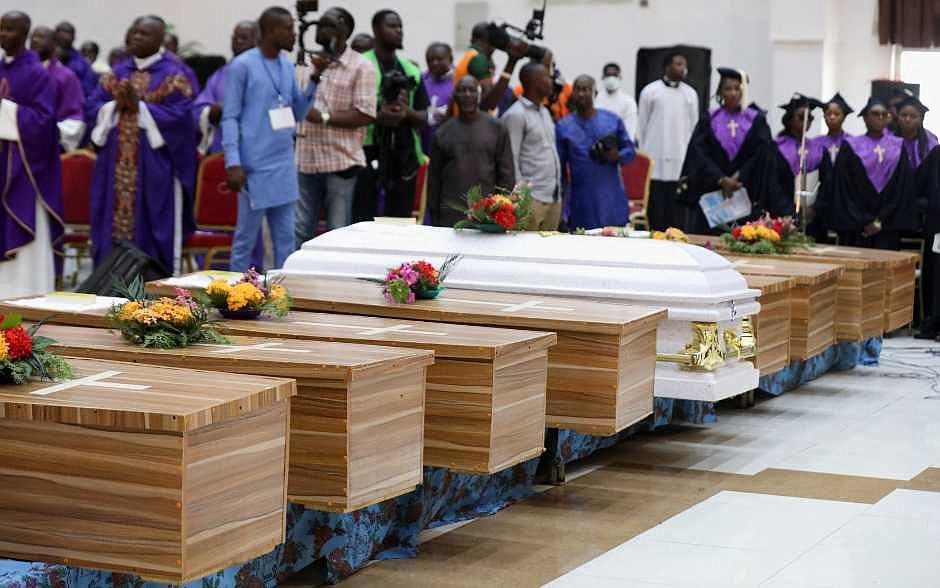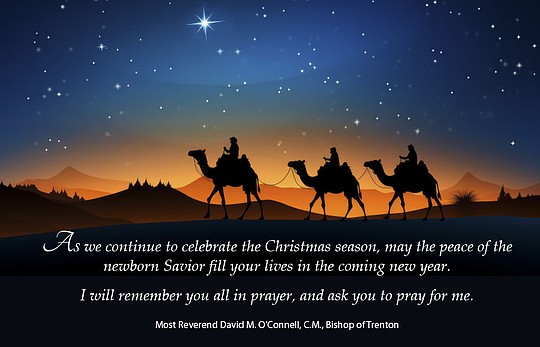Human rights groups: 900 civilians, mostly Christians, died in Nigeria's Imo state in just 29 months
May 25, 2023 at 4:43 p.m.

OSV News – A leading Nigerian human rights organization has published a report with sobering statistics on summary executions, maiming, forced disappearances and illegal detentions in Imo state of southeast Nigeria.
Presenting the report during a press conference May 21, Emeka Umeagbalasi, a Catholic human rights activist and chairman of the Intersociety organization, said that in just 29 months, from January 2021-May 2023, "security forces and allied militias killed 900 unarmed citizens, wounded 700, arrested 3,500, extorted 1,400, disappeared 300."
In addition, the report said 1,200 civilian houses were burned down, displacing 30,000 owners and their families and forcing 500,000 citizens to flee.
According to the report, non-state actors, such as Fulani jihadists and other militias were responsible for most of the deaths – 700 – and for an additional 900 kidnappings that occurred during the same time period.
Most of those killed in Imo state and elsewhere in southeast Nigeria might have been targeted because of their Christian faith, the report's authors stressed.
Umeagbalasi said that people are slain based on their ethnicity and religion, and he criticized the Nigerian police for rarely looking into the crimes.
"We are not against the police and security agencies performing their jobs," Umeagbalasi told journalists, "but they have to do that within the confines of the law."
"You don't leave the fighting parties" and "turn a blind eye" on civilians, he said.
The organization confirmed at the press conference that houses of worship had been pillaged in Imo state, with 200 synagogues and 300 temples of traditional beliefs being burned down or destroyed – on the mere suspicion that they serve as support centers for local separatist movements.
"There is no evidence whatsoever to this claim," said Umeagbalasi, who is originally from the Archdiocese of Onitsha.
"You cannot kill every Muslim in the north and tag them Boko Haram. You cannot go to a mosque and burn down the Mosque and say it's a training ground for Boko Haram," Umeagbalasi said, referring to a terrorist group targeting Christians, but stressing that Christians never take that kind of vindictive approach.
On April 10, a previous report by Intersociety revealed that over 50,000 Christians had been killed in Nigeria since the 2009 Islamic uprising in Africa's most populous nation. The government of President Muhhamadu Buhari has maintained silence in the face of the killings since it took power in 2015, according to Catholic groups.
"All persons of goodwill can attest that the federal government has done very poorly in responding to this security challenge. After eight years there has been zero arrests and prosecution of perpetrators of these heinous crimes, which gives reason to the suggestion that the government of the day may be complicit in what is happening," Father Remigius Ihyula of Makurdi Diocese told OSV News.
[[In-content Ad]]
The most recent tragic mass killing by a Fulani jihadist group happened May 20 when members of St. Michael's Agasha Parish in Father Ihyula's diocese were attacked and killed while peacefully working on their farms.
The government, instead of protecting the citizens, according to Umeagbalasi, has resorted to "bribes" intended to "silence the voices of dissent." He said many activists have been "coerced" into "becoming government supporters."
He said that the government had taken out loans to pay lobbyists and "cover up the persecution of Christians."
On May 29, President Buhari will hand over power to Bola Tinubu, the newly elected president of Nigeria. However, Johan Viljoen, the director of the Denis Hurley Peace Institute (DHPI) of the bishops' conference of South Africa, predicted that "it is clear that nothing is going to change" regarding the persecution of Christians in Nigeria.
"With a Muslim-Muslim ticket we can expect things to get worse. And there seems to be an
escalation. The day after the election, six communities in Benue state were under simultaneous attack. We are now seeing violence spreading. From Imo state to Anambra," Viljoen told OSV News.
While the killings continue in Imo state and in several other places in Nigeria, Umeagbalasi's Intersociety is now requesting an international criminal investigation since "crimes against humanity, war crimes or the other internationally prohibited acts or conduct are taking place in Imo."
As a result, the rights group specifically requested that the U.N.'s Human Rights Office of the High Commissioner intervenes by investigating the issue by independent human rights experts typically tasked with looking into "grisly and egregious human rights abuses and violations such as the case of Imo state," Umeagbalasi said.
Ngala Killian Chimtom writes for OSV News from Yaoundé, Cameroon.
The Church needs quality Catholic journalism now more than ever. Please consider supporting this work by signing up for a SUBSCRIPTION (click HERE) or making a DONATION to The Monitor (click HERE). Thank you for your support.
Related Stories
Wednesday, December 31, 2025
E-Editions
Events
OSV News – A leading Nigerian human rights organization has published a report with sobering statistics on summary executions, maiming, forced disappearances and illegal detentions in Imo state of southeast Nigeria.
Presenting the report during a press conference May 21, Emeka Umeagbalasi, a Catholic human rights activist and chairman of the Intersociety organization, said that in just 29 months, from January 2021-May 2023, "security forces and allied militias killed 900 unarmed citizens, wounded 700, arrested 3,500, extorted 1,400, disappeared 300."
In addition, the report said 1,200 civilian houses were burned down, displacing 30,000 owners and their families and forcing 500,000 citizens to flee.
According to the report, non-state actors, such as Fulani jihadists and other militias were responsible for most of the deaths – 700 – and for an additional 900 kidnappings that occurred during the same time period.
Most of those killed in Imo state and elsewhere in southeast Nigeria might have been targeted because of their Christian faith, the report's authors stressed.
Umeagbalasi said that people are slain based on their ethnicity and religion, and he criticized the Nigerian police for rarely looking into the crimes.
"We are not against the police and security agencies performing their jobs," Umeagbalasi told journalists, "but they have to do that within the confines of the law."
"You don't leave the fighting parties" and "turn a blind eye" on civilians, he said.
The organization confirmed at the press conference that houses of worship had been pillaged in Imo state, with 200 synagogues and 300 temples of traditional beliefs being burned down or destroyed – on the mere suspicion that they serve as support centers for local separatist movements.
"There is no evidence whatsoever to this claim," said Umeagbalasi, who is originally from the Archdiocese of Onitsha.
"You cannot kill every Muslim in the north and tag them Boko Haram. You cannot go to a mosque and burn down the Mosque and say it's a training ground for Boko Haram," Umeagbalasi said, referring to a terrorist group targeting Christians, but stressing that Christians never take that kind of vindictive approach.
On April 10, a previous report by Intersociety revealed that over 50,000 Christians had been killed in Nigeria since the 2009 Islamic uprising in Africa's most populous nation. The government of President Muhhamadu Buhari has maintained silence in the face of the killings since it took power in 2015, according to Catholic groups.
"All persons of goodwill can attest that the federal government has done very poorly in responding to this security challenge. After eight years there has been zero arrests and prosecution of perpetrators of these heinous crimes, which gives reason to the suggestion that the government of the day may be complicit in what is happening," Father Remigius Ihyula of Makurdi Diocese told OSV News.
[[In-content Ad]]
The most recent tragic mass killing by a Fulani jihadist group happened May 20 when members of St. Michael's Agasha Parish in Father Ihyula's diocese were attacked and killed while peacefully working on their farms.
The government, instead of protecting the citizens, according to Umeagbalasi, has resorted to "bribes" intended to "silence the voices of dissent." He said many activists have been "coerced" into "becoming government supporters."
He said that the government had taken out loans to pay lobbyists and "cover up the persecution of Christians."
On May 29, President Buhari will hand over power to Bola Tinubu, the newly elected president of Nigeria. However, Johan Viljoen, the director of the Denis Hurley Peace Institute (DHPI) of the bishops' conference of South Africa, predicted that "it is clear that nothing is going to change" regarding the persecution of Christians in Nigeria.
"With a Muslim-Muslim ticket we can expect things to get worse. And there seems to be an
escalation. The day after the election, six communities in Benue state were under simultaneous attack. We are now seeing violence spreading. From Imo state to Anambra," Viljoen told OSV News.
While the killings continue in Imo state and in several other places in Nigeria, Umeagbalasi's Intersociety is now requesting an international criminal investigation since "crimes against humanity, war crimes or the other internationally prohibited acts or conduct are taking place in Imo."
As a result, the rights group specifically requested that the U.N.'s Human Rights Office of the High Commissioner intervenes by investigating the issue by independent human rights experts typically tasked with looking into "grisly and egregious human rights abuses and violations such as the case of Imo state," Umeagbalasi said.
Ngala Killian Chimtom writes for OSV News from Yaoundé, Cameroon.
The Church needs quality Catholic journalism now more than ever. Please consider supporting this work by signing up for a SUBSCRIPTION (click HERE) or making a DONATION to The Monitor (click HERE). Thank you for your support.










